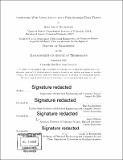Improving web applications with fine-grained data flows
Author(s)
Netravali, Ravi Arun
DownloadFull printable version (20.90Mb)
Other Contributors
Massachusetts Institute of Technology. Department of Electrical Engineering and Computer Science.
Advisor
Hari Balakrishnan and James Mickens.
Terms of use
Metadata
Show full item recordAbstract
Web applications have significantly increased in complexity over the past several decades to support the wide range of services and performance requirements that users have come to expect. On the client-side, browsers are multi-process systems that can handle numerous content formats, rich interactivity, and asynchronous 10 patterns. On the server-side, applications are distributed across many machines and employ multi-tier architectures to implement application logic, caching, and persistent storage. As a result, web applications have become complex distributed systems that are difficult to understand, debug, and optimize. This dissertation presents fine-grained data flows as a new mechanism for understanding and optimizing complex web applications. Fine-grained data flows comprise the set of low-level reads and writes made to distributed application state during execution. We explain how fine-grained data flows can be tracked efficiently in production systems. We then present four concrete systems that illustrate how fine-grained data flows enable powerful performance optimizations and debugging primitives. Polaris dynamically reorders client HTTP requests during a page load to maximally overlap network round trips without violating data flow dependencies, reducing page load times by 34% (1.3 seconds). Prophecy uses data flow logs to create a snapshot of a mobile page's post-load state, which clients can process to elide intermediate computations, reducing bandwidth consumption by 21%, energy usage by 36%, and load times by 53% (2.8 seconds). Vesper is the first system to accurately and automatically measure page time-to-interactivity, without using heuristics or developer annotations. Vesper determines a page's interactive state by firing event handlers and analyzing the resulting data flows. Vesper-guided optimizations improve time- to- interactivity by 32%, generating more satisfaction in user studies than systems targeting past metrics. Cascade is the first replay debugger to support distributed, fine-grained provenance tracking. Cascade also enables speculative bug fix analysis, i.e., replaying a program to a point, changing program state, and resuming replay, using data flow tracking and causal analysis to evaluate potential bug fixes.
Description
Thesis: Ph. D., Massachusetts Institute of Technology, Department of Electrical Engineering and Computer Science, 2018. Cataloged from PDF version of thesis. Includes bibliographical references (pages 131-144).
Date issued
2018Department
Massachusetts Institute of Technology. Department of Electrical Engineering and Computer SciencePublisher
Massachusetts Institute of Technology
Keywords
Electrical Engineering and Computer Science.
